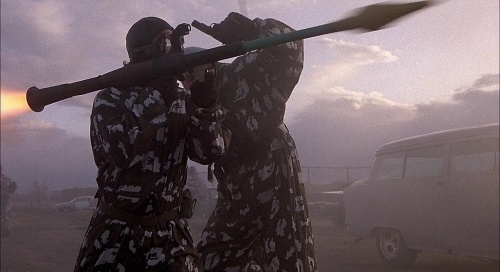|
Battlefield Alaska
by Chris Oakley
 Author
says: this post represents a selection of articles posted on the
Today in Alternate History web site. Please note that the opinions
expressed in this post do not necessarily reflect the views of the author(s). Author
says: this post represents a selection of articles posted on the
Today in Alternate History web site. Please note that the opinions
expressed in this post do not necessarily reflect the views of the author(s).

April 27th 1984,
a Soviet expeditionary force crossed the Bering Strait and and landed on
the shores of Alaska in the first phase of a bold military campaign aimed
at conquering the United States and Canada; the Red Army high command
expected to accomplish their objectives in Alaska with little resistance
and establish control over all of North America within 45 days at most.
Instead, however, the Soviet invasion ran into trouble almost immediately
-- KGB estimates of US troop strength in the immediate vicinity of the
beachheads would prove in many cases to be wildly inaccurate, and to
complicate things even further Canadian
Please click the
 icon to follow us on Facebook.
icon to follow us on Facebook.ground forces were deployed to
Alaska to back up the US defenders.
Within 48 hours half the initial Soviet landing force had been killed in
action and President Ronald Reagan had retaliated by ordering US Marines
at Guantanamo Bay to attack Soviet military outposts in Cuba. The Soviet
assault on Alaska would later be recalled as the start of World War III
and become a major catalyst in hastening the downfall of the Communist
bloc as world opinion turned sharply against the Soviet Union in the wake
of its unprovoked aggression against America. Soon the Kremlin would also
face strong internal opposition as thousands of Russian citizens took to
the streets of Moscow and Leningrad (later St. Petersburg to protest the
massive casualties resulting from the Alaska invasion.
In the months that followed the failed offensive, the USSR's longtime
Warsaw Pact allies would desert it one by one; within a

May 1st,
Soviet ruler Yuri Andropov marked the May Day holiday in Moscow with a
speech justifying the ill-fated Soviet assault on the Alaskan coastline
as -- in his words -- "a necessary response to the imperialistic agenda
of the capitalist powers".
He also claimed, in the face of mounting evidence to the contrary,
that the Alaska operation had been a success. But in reality, most of
the Soviet beachheads had long since been wiped out and the few that
remained were under punishing US air and naval bombardment. Battlefield
Alaska by Chris OakleyFew people, even among Andropov's closest
advisors, had any idea that Andropov was in the midst of a
psyhchological breakdown or that this breakdown, combined with general
distrust of the West and lingering anger over the "Able Archer" incident
of 1983, had been one of the primary motivations for Andropov's
misguided decision to go to war with the United States.
Papers recovered from the Russian defense archives after the Soviet
Union collapses would later reveal that Andropov had been convinced the
United States was about to attack Siberia and this delusion had provoked
him to order the landings in Alaska.
Within hours of Andropov's speech, his already severe problems would get
exponentially worse; China, seeing an opportunity to readjust the
Sino-Soviet border to its own advantage and strengthen ties with the
Untied States, declared war on the Soviet Union and sent several of the
PLA's top divisions into Siberia.
June 21st,
Czechoslovakia's so-called "Velvet Revolution" swept the Communist regime
in Prague out of power as a coalition
 of
students, intellectuals, journalists, clergy, and dissident lawmakers
occupied key government buildings in the Czech capital and proclaimed the
establishment of a new Czech Republic.
Although at first there were some fears the Soviet Union might try to halt
the Velvet Revolution by force just as they had crushed the "Prague
Spring" experiment sixteen years earlier, those fears gradually subsided
as it became clear Soviet military forces were too preoccupied elsewhere
to offer more than token opposition to the bloodless coup.
One of the leading figures of the Velvet Revolution was a playwright and
ex-political prisoner named Vaclav Havel (pictured); in the aftermath of
World War III Havel became prime minister of Czechoslovakia's first
democratically elected government since 1948 and served two six-year terms
in that office before retiring from the political arena in the mid-1990s.
In an ironic reversal of the German reunification, the later years of
Havel's second term as PM would see Czechoslovakia split into separate
Czech and Slovak states.
 Author
says to read the whole time or to view guest historian's comments on
this thread please visit the
Today in Alternate History web site. Author
says to read the whole time or to view guest historian's comments on
this thread please visit the
Today in Alternate History web site.
Chris Oakley, Guest Historian of
Today in Alternate History, a Daily Updating Blog of Important Events In
History That Never Occurred Today. Follow us on
Facebook,
Squidoo, Myspace and
Twitter.
Imagine what would be, if history had occurred a bit
differently. Who says it didn't, somewhere? These fictional news items
explore that possibility. Possibilities such as America becoming a Marxist
superpower, aliens influencing human history in the 18th century and Teddy
Roosevelt winning his 3rd term as president abound in this interesting
fictional blog.

Sitemetre

 |